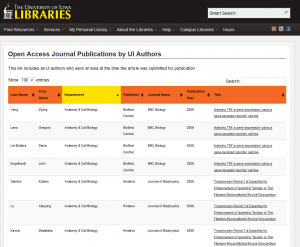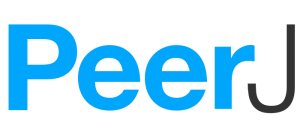Kathy Giusti, co-founder of the Multiple Myeloma Research Foundation (MMRF), was featured on MSNBC’s Morning Joe this week to talk about how the open sharing of data can improve cancer research. The MMRF recently launched the MMRF Research Gateway to serve as an open access portal for data on Multiple Myeloma, a common form of blood cancer. The goal is to make the data openly available so that progress in cancer treatment can be accelerated. The MMRF Research Gateway requires registration, however non-profit academic, private, and governmental users can access the data free of charge. Watch the clip.
Open Access Category
University of Iowa Authors Publish in Open Access Journals
Table of University of Iowa faculty Members Publishing in Open Access Journals
Open Access journals are peer-reviewed and are freely available online to students, researchers, and the general public. As an alternative to the subscription-based model, Open Access publishing removes access barriers to increase the availability and impact of scholarly literature. University of Iowa authors have been publishing in Open Access journals since 2006. While Open Access journals provide free access to their content, they are not always free to publish. Some journals, particularly in the sciences, charge article-processing fees to cover the costs of publishing. Luckily, the Universities Libraries and the Office of the Provost have established the Open Access Fund to cover these fees. Not sure if Open Access is right for you? Browse this table of University of Iowa Open Access publications and consider if this route is right for you.
PeerJ Survey Shows High Author Satisfaction
The results of a survey of authors who submitted their research to PeerJ for publication were released today. The survey measures the satisfaction of authors from the first six-months of the journal’s publishing operations. With a 51% response rate, the results looks promising. Some highlights:
- 92% of authors report having a “good experience” or better with publishing in PeerJ
- 83% of authors intend to submit their future research, with 17% reporting “maybe,” depending on the subject appropriateness for the journal
- 94% of authors would recommend PeerJ to a colleague
PeerJ is a peer-reviewed, open access publisher of research articles in the biological, medical, and health sciences. Operating on an author membership model, as opposed to article-processing fee model, member authors can submit articles for publishing after paying a one-time membership fee. For authors interested in soliciting feedback on works-in-progress, there is also a free PrePrints option. [Read the announcement]
This week in Open Access: SHARE
Yesterday, the Scholarly Publishing & Academic Resources Coalition (SPARC) released a letter sent to John Holdren, the Director of the White House Office of Science and Technology Policy (OSTP), requesting copies of U.S. government agency plans to make the results of federally funded research freely available to the public. This follows up on a February 22nd, 2013, White House OSTP memorandum directing federal agencies that annually provide $100 million in funding for research and development to “develop a plan to support increased public access to the results of research funded by the Federal Government. This includes any results publishing in peer-reviewed scholarly publications.” The deadline for these proposals was August 22nd, 2013, and there has been no official word on the specifics of these plans yet.
To comply with these policy changes (once they take effect), the SHared Access Research Ecosystem (SHARE) has been proposed by the Association of American Universities (AAU), the Association of Public and Land-grat Universities (APLU), and the Association of Research Libraries (ARL). This system will leverage current digital repository infrastructure already in place and in use at large state and publically funded Universities to create a network of publically funded, open access research through a common metadata schema. Here at the University of Iowa, our digital repository system is called Iowa Research Online.
Toward the making SHARE a reality, the AAU, APLU, and the ARL announced yesterday the formations a Joint Steering Group comprised of University Administrators, Librarians, and Technologists was formed to see this project through completion. You can read more about SHARE here.
The Real Digital Change Agent: Institutional Open Access Policies
Jason Mittell, an associate professor of film and media culture at Middlebury College, has written an interesting opinion piece on Institutional Open Access Policies (there is a coalition of them called Coapi) that are making the much of the scholarly output at participating institutions freely available online. He ponders why these OA Policies are not making the news more often, while MOOCs (massive open online courses) are consistently discussed in the media, and viewed as a revolutionary way to extend the reach of scholars.
He writes: “Odds are that you haven’t read much about Coapi as a revolutionary, democratizing force within higher education, especially compared with its high-profile contemporary, MOOCs (massive open online courses). While it’s quite rare to read about open-access policies in the popular news media, celebrations of MOOCs as the Great Revolution About to Overturn Higher Education As We Know It litter newspapers’ opinion pages—for instance, Thomas Friedman’s recent celebratory gloss in The New York Times.”
Read more of his opinion piece in the Chronicle of Higher Education.
Launch of the Digital Public Library of America (DPLA)
The DPLA announced on Tuesday that Daniel J. Cohen, a leading digital-humanities scholar, will be the project’s founding executive director.
Cohen sketched out a vision of the DPLA as both a gatherer of information and a gateway to it. It will be “an important nationwide collaboration of state and regional digital libraries who will bring together all the local content and bring it upstream to this giant ocean that will be the DPLA,” he said. “The DPLA, in turn, will redirect the general public and scholars and teachers” to digital collections and cultural resources across the country.
“The idea that we can bring all this content to Americans and people all across the world is tremendously compelling,” Mr. Cohen said.
Read more at the Chronicle of Higher Education.
Open Access journal PeerJ publishes first articles
For a very different approach to scholarly publishing, take a look at the inaugural articles in PeerJ: https://peerj.com/
NIH to begin enforcing Open Access Policy
NIH to Begin Enforcing Open-Access Policy on Research It Supports, by Paul Basken
Chronicle of Higher Education, Nov. 19, 2012
Excerpt:
The NIH, in a statement issued on Friday, said that beginning in about five months, it would block the renewal of grant awards in cases where journal publications arising from the award do not comply with its open-access rule.
The NIH’s online database, PubMed Central, has some 260,000 papers collected under the policy, or about three-fourths of the eligible publicly financed research, an agency official said.
“While compliance to the policy currently stands at 75 percent and continues to edge upward,” said Neil M. Thakur, program manager for the public-access policy in Ms. Rockey’s office, the “NIH believes that four years has been sufficient time for NIH grantees to adjust to the requirement.”
Cornell gets major grant to support arXiv
Cornell University Library has announced a major grant from the Simons Foundation to support the costs of operating arXiv. The grant will provide up to $300,000 per year to match contributions from institutions which have supported arXiv since 2010. From the announcement:
arXiv, the free repository that has revolutionized the way scientists share information, is adopting a new governance and business model that will allow it to grow and succeed in the future….As an open-access service, [arXiv] allows scientists to share “preprint” research before publication and boasts hundreds of thousands of contributors. In 2011 alone, arXiv saw close to 50 million downloads from all over the world and received more than 76,000 new submissions.
Iowa–through the University Libraries–has committed to providing annual support for arXiv since a call for support went out from Cornell. It is an especially important resource for researchers in physics, mathematics, and computer science, among others. It has been hosted at Cornell since 2001, when its founder, Paul Ginsparg, joined the faculty. See also the article by Jennifer Howard in the Chronicle.
US News & World Report takes on academic journal publishing
In a long piece online at its web site, Simon Owens of US News and World Report offers an overview of academic (chiefly scientific) journal publishing and the rise of open access. See “Is the Academic Publishing Industry on the Verge of Disruption?” Starting with the recent Harvard letter on journal prices (see Transitions for April 23, 2012), the article reports on moves toward open access publishing, and resistance from commercial “closed access” publishers.



